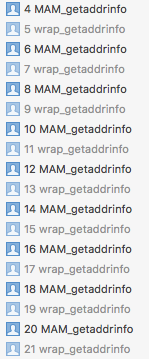-
Notifications
You must be signed in to change notification settings - Fork 973
New issue
Have a question about this project? Sign up for a free GitHub account to open an issue and contact its maintainers and the community.
By clicking “Sign up for GitHub”, you agree to our terms of service and privacy statement. We’ll occasionally send you account related emails.
Already on GitHub? Sign in to your account
fishhook conflict with address sanitizer #47
Comments
|
I ran into the same problem. After some poking around, I think I understand what's causing the infinite recursion: When building an app with "Thread Sanitizer" or "Address Sanitizer", the compiler generates a special DLL named These special DLLs are "interposed" by the linker on top of the system libraries before the app's symbols are resolved. The pseudocode for wrap_getaddrinfo() looks like: When Fishhook does it's rebinding, it does a massive search & replace of all references of getaddrinfo() to MAM_getaddrinfo(). Including the one in the specially generated DLL. Hence, leading to the infinite recursion. Whatever the solution, it will involve breaking this cycle. |
|
A dirty hack that seems to work is: A better fix would be to better identify these special compiler generated DLLs instead of hardcoding the file names. |
|
@grp Is there any plan for adding any of the suggested fixes? It would be incredibly advantageous for users trying to debug with sanitizers and fishhook. |
This causes a compilation issue with |
|
@tirodkar For me, the following change worked: Add #include <libgen.h>at the top section, then the following changes: static void _rebind_symbols_for_image(const struct mach_header *header, intptr_t slide) {
uint32_t c = _dyld_image_count();
for (uint32_t i = 0; i < c; i++) {
// HACK: Get file name of the mach header
if (_dyld_get_image_header(i) == header) {
const char *path = _dyld_get_image_name(i);
const char *base = basename((char *)path);
// Only rebind libraries that are not the special generated sanitizer ones
if (strcmp(base, "libclang_rt.tsan_iossim_dynamic.dylib") &&
strcmp(base, "libclang_rt.asan_iossim_dynamic.dylib"))
{
rebind_symbols_for_image(_rebindings_head, _dyld_get_image_header(i), _dyld_get_image_vmaddr_slide(i));
}
return;
}
}
}(There was a bug in @dlow-yahoo-inc ‘s code above, but easy to fix.) |
I hook socket relevant c function in my project, like getaddrinfo,connect,socket and so on. When I open address sanitizer for debug I found some error like this:

It seems that both address sanitizer and fishhook hooked getaddrinfo() , and result in a conflict.
The following WWDC video said sanitizer hook standard c library.
reference: https://developer.apple.com/videos/play/wwdc2015/413/
The text was updated successfully, but these errors were encountered: